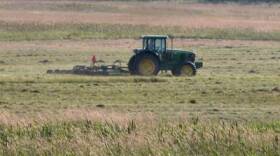The New York Farm Bureau outlined its national priorities this week. Labor and dairy pricing remain key issues for the agricultural sector.
The state Farm Bureau meets annually with congressional representatives to discuss pending legislation and highlight issues of concern. The meetings held virtually this year have focused on agricultural labor, dairy pricing, supply chain issues and supporting rural mental health services.
New York Farm Bureau President David Fisher, a farmer from Madrid, says the agriculture sector continues to deal with inflation pressures, supply chain issues and a host of regulatory issues. But he says the top concern, as has been the case for years, is labor.
“It’s a perennial issue. We’re looking to address both short term and long term labor needs which would allow current trained workers who are already in the country to stay and work. We’d also like to modernize the H2A federal guest worker program to have a continuous legal workforce for all sectors of agriculture. Currently only farms with seasonal work can apply for this temporary worker program." Fisher added, "So this is especially important right now as New York state is looking to lower the overtime threshold for farm workers and if that should happen we’ve heard some workers will probably choose to leave New York and find employment elsewhere where they can get the hours they need.”
On January 28th the three-member New York Department of Labor Farm Laborers Wage Board voted 2 to 1 to lower the farm worker overtime threshold from 60 to 40 hours over a 10-year period beginning January 1st , 2024. Fisher was the nay vote.
The vote came after a number of public hearings. At the January 4th hearing Erie County organic vegetable farmer Laura Colligan spoke in favor of lowering the threshold.
“People who work on farms were excluded from overtime protections in the Federal Fair Labor Standards Act of 1938 at the insistence of openly racist southern state senators. It’s been 84 years. Time to move past this embarrassing legacy and towards giving farm employees the same overtime protections that all other workers enjoy." Colligan emphasized, "Other industries like retail have figured out how to run businesses that have labor needs that vary seasonally while operating under a 40 hour overtime threshold. Agriculture can too.”
The price dairy farmers receive for milk is also a concern for the New York Farm Bureau. Fisher reported that they are part of a national work group assessing policies and potential solutions.
“We’re asking USDA to examine and modernize the current federal Milk Marketing Order system that determines what farmers receive for their milk based on what is currently a very complicated and old formula. One potential avenue to do this would be Senator Gillibrand’s dairy pricing bill.”
Supply chain problems across the nation are impacting farmers and Fisher doesn’t expect any relief soon.
“We’ve seen products not get to market when elements broke down such as transportation or manufacturing. We also had problems getting ahold of equipment and parts and it appears from experience recently that this year is going to be even worse. We have many parts back ordered, not available and prices are in many situations double what they were last year," related Fisher. "We’ve even seen some of the major crop companies declare force majeure and break some contracts because they can’t get or they can’t deliver some of the projects needed. New York Farm Bureau is looking to implement a process that will identify problems and put regulatory administrative actions in place to deal with the issues.”
New York Farm Bureau Senior Associate Director of Public Policy and National Affairs Lauren Williams said another priority is addressing the impacts of climate change and science-based environmental policies.
She said there is also a critical need, especially in the wake of the pandemic, to raise awareness and encourage broader use of ag-specific mental health resources and assistance.
“Like everyone the past few years have been challenging for farms on many levels. COVID illnesses and deaths, supply chain issues and economic uncertainty have piled on farmers and farm workers alike. This is a stressful time and we want to ensure that there are enough resources in place for our farmers and rural communities to cope with this.”
Force majeure is a clause in contracts that allows a party to withdraw from its obligations due to uncontrollable events.
The farm worker overtime threshold resolution has been referred to the governor’s office.















